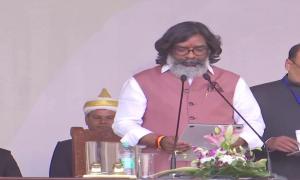More than a fortnight has elapsed since a Japanese company, Daiichi Sankyo, announced its plan to acquire a controlling stake in Ranbaxy, India's largest drug multinational. But reactions from political parties or trade union leaders continue to be unusually muted.
Of course, nothing much was expected from Congress leaders, who are understandably preoccupied with graver issues of national and international significance - bringing the inflation rate under control, salvaging the India-US civil nuclear deal and most importantly keeping the government intact while at the same time preventing an early election.
The calm that prevails in the Left and BJP camps, however, is quite puzzling and has naturally prompted social scientists and experts to come to all kinds of conclusions about the maturity of India's opposition leaders. With the exception of LK Advani, who expressed his disappointment over the deal (did he feel as disheartened when non-resident Indians withdrew their deposits from Indian banks in 1990-91 when the Indian economy was on the verge of a collapse?), no leader of significance - either from the Left or the BJP - has as yet attacked the deal that will result in India's largest generic drugs company becoming a Japanese subsidiary.
Thus, the absence of any adverse jingoistic reaction (a cry of distress over a Japanese attack on India's economic nationalism!) is being hailed as a sign of maturity among India's politicians.
They are also being patted for their enlightened thinking and acceptance of the terms on which globalisation operates. Just as Indian business houses will be gobbling up international brands and companies (the Tatas taking over Corus and Jaguar-Land Rover are only a few among the recent high-profile cases), it is only natural that Indian companies may also be acquired by foreign companies.
These are two sides of the same coin. Hailing the acquisition of global brands and corporate entities by Indian companies and at the same time raising alarm signals over global giants taking over Indian companies will be hypocritical, unethical and even embarrassing.
Indeed, this is in sharp contrast to the manner in which politicians in many other developed countries have reacted to instances of foreign companies making a bid for taking over companies that they think "belong" to their countries.
Politicians in France and even in the US make no secret of their disagreement with any move that either leads to the acquisition of local companies by foreign multinationals or to the transfer of jobs from their countries to developing countries like India in what is popularly called "outsourcing deals".
Does it, therefore, mean that Indian politicians, in general, have become far more mature and globalised at heart than their counterparts in developed countries, particularly as far as economic policies are concerned?
It is tempting to arrive at such a conclusion, though a deeper probe into the mindset of Indian politicians is likely to provide a different picture. At the heart of the issue is the widely acknowledged fact that politicians - in India or any other democracy - will always like to do what might please their voters.
In a country like India, where about two-thirds of the population continue to depend on agriculture and allied sectors for livelihood, politicians will have to be conscious of any move that might go against the farming community.
In the same way, outsourcing deals cause a political uproar in the US because politicians in that country are rattled by job losses that directly affect a large number of voters. No politician wants - nor should he be expected - to lose votes.
The absence of any response from Indian politicians to the Ranbaxy deal, therefore, is not to be attributed to their mature understanding of the processes of globalisation. Whether such mature understanding exists or not is quite immaterial and a completely different issue.
The reason for their silence is that the Ranbaxy deal has not hurt the interests of most sections of the voting community. Let alone farmers, even the urban voters are not bothered by the deal as it has no direct adverse impact on them.
How about the Left parties? They too are the least bothered by a deal where ownership of a company has changed hands. They would have raised a banner of protest if Ranbaxy was a state-owned company and had a large number of workers affiliated to an organised trade union, most probably owing allegiance to one of their political outfits.
Then only the issue of a Japanese company acquiring ownership of an Indian company would have had the potential of harming the interests of workers, a constituency from which the Left parties draw their sustenance. This is also why the Left opposes the disinvestment of government equity in public sector undertakings.
Indian politicians are far from acquiring a mature understanding of the globalisation process. The Ranbaxy deal's insignificant impact on the politicians' vote bank is the reason behind their silence.









More from rediff